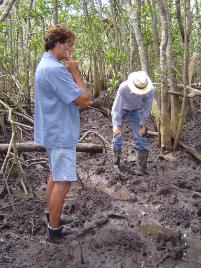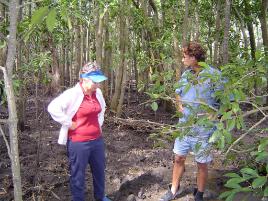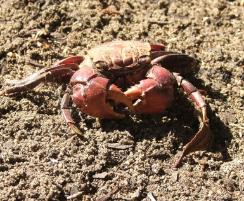Study checks impact of stormwater drains on crabs and mangroves
Published on 19 March, 2008
A study by PhD student Derek Ball is checking whether the concentration of rainwater at single points of mangrove communities, caused by urban development and altered stormwater drainage patterns, is reducing the number of grapsid crabs.
These crabs are considered a key to the health of the mangroves through leaf removal and processing.

Derek Ball (left) discusses his project with Dr Steve McKillup
Mr Ball, who is based in the Mackay area, said his project came about because people noticed that lower numbers of crabs seemed to coincide with places where stormwater flows had been altered, typically by storm-water drains leading from adjacent residential areas.
"Such areas are characterised by large areas of rainfall impervious surfaces such as house roofs, bitumen roads, and concrete driveways, which drain to a storm-water collection system that terminates at the edge of the mangroves, delivering large quantities of freshwater directly into the community at one point," he said.
"The lack of grapsid crabs in these areas is of concern as they are well recognised to be keystone species within some mangrove communities."
Mr Ball said the study aimed to:
- Determine if point discharge of storm-water affects grapsid populations.
- Investigate the mechanisms by which grapsids may be affected.
- Estimate the likely impact of a reduction in grapsid populations on the mangrove community.
"Results to date provide strong evidence that grapsids are fewer within mangrove habitats which receive storm-water run-off," Mr Ball said.
"Within these affected areas, soil core water salinity is significantly reduced and it is hypothesised that this reduction may be below that which grapsids can tolerate. This hypothesis will be further tested by laboratory experiments.
"The vegetation composition at storm-water affected sites also differs ... as grapsids may have preferences for feeding on different mangrove species, this change in vegetation may influence grapsid abundance. However, field experiments have so far failed to detect preferences for feeding."

Derek Ball (left) discusses the project with Dr Judith Wake

A grapsid crab

